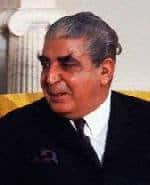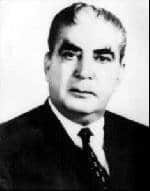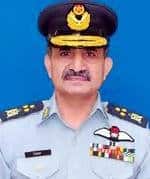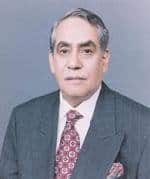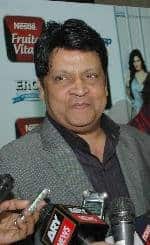Yahya Khan Third President of Pakistan
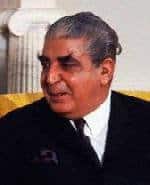
General Agha Mohammad Yahya Khan was born at Chakwal in February 4, 1917 August 10, 1980 was the senior Army Commander who was the third President of Pakistan, and the military dictator from 1969 until the dissolution of East-Pakistan, in December 16, 1971. Yahya was born to a family that was descended from the elite soldier class of Nāder Shah, the Persian ruler who conquered Delhi in the 18th century.
Born in 1917 in Chakwal in the British Punjab, then part of the British Indian Empire, Khan was commissioned into the Indian Army and served with distinction in World war II, seeing active service in the North Africa, Middle East, and Mediterranean theatres of the war. After the world war, Khan opted the Pakistani citizenship and became one of the earliest senior local officers in the Pakistan Armed Forces. After his successes with Operation Grand Slam during the Indo-Pakistani war of 1965, Khan was promoted to become one of the Pakistan Army’s top commanders. He was first appointed as Chief Martial Law Administrator in 1968, succeeding Field Marshal Ayub Khan as military dictator and president in 1969, declaring martial law and dissolving much of the civilian infrastructure, government ministries and appointments, replacing them with military infrastructure and personnel instead.
When, in 1969, countrywide agitation rendered the situation out of control, Ayub Khan decided to hand over power to the Army Chief, General Yahya Khan. Immediately after coming to power, Yahya Khan declared Martial Law in the country on March 25, 1969, and assumed the title of Chief Martial Law Administrator. He terminated the Constitution and dissolved the National and Provincial Assemblies. On March 31, he also became President of the Islamic Republic of Pakistan.
Career before becoming commander-in-chief
Upon the formation of Pakistan, Khan helped set up an officer’s school in Quetta, and commanded an infantry division during the Indo-Pakistani War of 1965. Immediately after the 1965 war Major General Yahya Khan who had commanded the 7th Division in Operation Grand Slam was promoted to the rank of Lieutenant General, appointed Deputy Army Commander in Chief and Commander in Chief designate in March 1966. At promotion, Yahya Khan superseded two of his seniors, Lt Gen Altaf Qadir and Lt Gen Bakhtiar Rana.
President of Pakistan
Ayub Khan was President of Pakistan for most of the 1960s, but by the end of the decade, popular resentment had boiled over against him. Pakistan had fallen into a state of disarray, and he handed over power to Yahya Khan on 25 March 1969. In his first nationwide address, Yahya reimposed martial law, saying, “I will not tolerate disorder. Let everyone remain at his post.” YAHYA KHAN
The last days of Pakistani East Bengal
Within a year of 28 July 1969 he had set up a framework for elections that were held in December 1970. In East Pakistan, the Awami League (led by Mujibur Rahman) held almost all of the seats, but none in West Pakistan. In West Pakistan, the Pakistan Peoples Party (led by Zulfiqar Ali Bhutto) won the lion’s share of the seats, but none in East Pakistan. Though Mujib had 162 seats in the National Assembly and Bhutto had 88 of PPP. The election results truly reflected the ugly political reality: the division of the Pakistani electorate along regional lines and political polarization of the country between the two wings, East and West Pakistan. In political terms, therefore, Pakistan as a nation stood divided as a result. Bhutto and Mujib where unable to come to an agreement on on the transfer of power from to East Pakistan on the basis of this Six-Point Program. Many felt that the 6 points where a step towards secession. It since emerged that Mujib met Indian diplomats in London according to his daughter in 1969 from where he agreed to secede from Pakistan
Yahya Khan ordered a crack down to restore the writ of the government. Operation Searchlight began on 25 March 1971 and soon restored order. However, the gulf between the two wings now was too wide to be bridged. Agitation now transformed into a vicious insurgency as Bengali elements of Pakistani armed Forces and Police mutinied and fled to India from where they received assistance to launch hit and run operations.
Operation Searchlight ordered by Yahya was a planned military pacification carried out by the Pakistan Army to curb the Bengali nationalist movement in erstwhile East Pakistan in March 1971Ordered by the government in West Pakistan, this was seen as the sequel to Operation Blitz which had been launched in November 1970.
Unlike Pakistan’s other military rulers, Yahya Khan was not interested in prolonging his rule. Immediately after taking charge of the country, he started looking for options through which he could hand over power to the elected representatives. On March 29, 1970, through an Ordinance, he presented an interim Constitution, the Legal Framework Order. It was actually a formula according to which the forthcoming elections were to be organized. It goes to the credit of Yahya Khan that the first general elections in the history of Pakistan were held during his regime in December 1970.
The trouble started when the results of the elections were announced. The Awami League, under the leadership of Sheikh Mujib-ur-Rahman, swept 160 out of 162 seats allocated to East Pakistan. However, the party failed to get even a single seat from any province of the Western Wing. On the other hand, Zulfiqar Ali Bhutto’s Pakistan Peoples Party emerged as the single largest party from Punjab and Sindh and managed to win 81 National Assembly seats, all from the Western Wing. This split mandate resulted in political chaos where neither Bhutto nor Mujib was ready to accept his opponent as the Prime Minister of Pakistan. When Bhutto and Mujib failed to reach an understanding about convening a session of the newly elected National Assembly, the ball fell in Yahya Khan’s court. He handled the situation badly. He used army and paramilitary forces in East Pakistan to crush the political agitation. This resulted in the beginning of the war between Pakistan and India in the winter of 1971.
Yahya Khan, as President as well as the Commander-in-Chief of Pakistan Army, failed to plan the war. This ultimately resulted in the defeat of Pakistan, dismemberment of the country and imprisonment of more than 90,000 Pakistanis. Surrender of Pakistani forces without any resistance and the fall of Dhaka made Yahya Khan the greatest villain in the country. People from all walks of life started criticizing him and thus he was left with no other option but to hand over the power to the leader of the most popular party of the remaining part of Pakistan, Zulfiqar Ali Bhutto, on December 20, 1971. Later Bhutto placed Yahya Khan under house arrest in 1972.
Death
Yahya Khan died on August 10, 1980 in Rawalpindi, Pakistan.
Yahya Khan Pictures
|
|
|
| ||||||||
